Insights and experiences
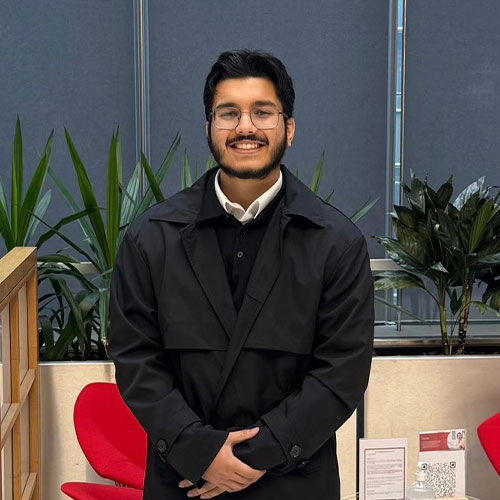
An Internship in Product Control
Ishaan
I was fortunate enough to participate in MUFG’s Summer Internship within Product Control, a programme which largely shaped my understanding of the world of finance and has been a defining factor in my professional career thus far.
The programme was scheduled for 10 weeks and I believe the Early Careers team really approached the itinerary for these 10 weeks with the due diligence to ensure it’s as productive and insightful as possible for all parties. You can expect to spend the first week of the programme with your cohort-colleagues, as this week is typically reserved to provide you with the foundational knowledge needed so you’re well prepped for the remaining 9 weeks on the desk. From the training, I learnt more the history of banking and had the opportunity to develop an in depth understanding of a wide range of financial products whilst developing more technical skills (like VBA and bond pricing). This training was massively well-received – those from non-financial backgrounds did not feel overwhelmed but also those with some knowledge in the field left knowing more than when they came in.
Following the training period, I recall being particularly nervous about starting on the desk. Now, this was admittedly more than the nerves you feel before starting a new job, but was more so related to many of the misconceptions that are always thrown around about the world of banking. It did not take long for MUFG to dispel my unease. My team were really accommodating and very committed to ensuring I got as much out of the programme as possible. For instance, I had the opportunity to sit down with most members of the team, understanding the desks which they produced P&L for and how different instruments changed valuation on a day-to-day basis – this gave me a holistic and well-rounded understanding of the function and also complemented the knowledge I had acquired during the training period. I was then assigned my own P&L. The team will ensure that this is one that, while it caters to your current skillset and understanding, also has tangible impacts on the firm – it’s important work which motivates you to approach it with care.
You will also be assigned a ‘buddy’ during this experience and that goes a long way to ensuring you never feel isolated nor left to your own devices. Your buddy would likely be someone who has been through the same programme before and consequently would be familiar with all the things you might currently be thinking or feeling. Furthermore, it was to my surprise that every member of the organisation I had asked – from Analyst to Managing Director – was more than willing to go for a chat over coffee. This afforded me the opportunity to leverage the knowledge and experiences of those who had been in the industry for years and I was able to get insights you wouldn’t otherwise be able to access.
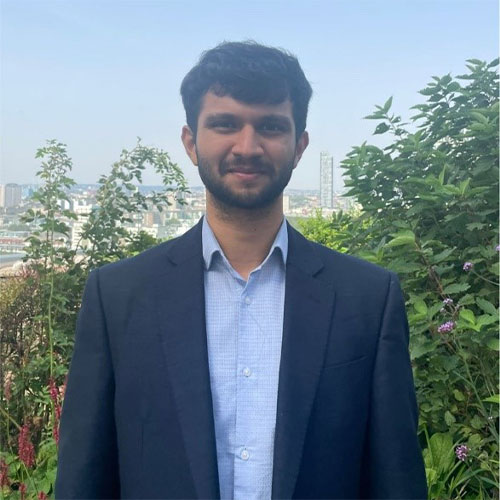
Embracing opportunities: My journey with MUFG's technology analyst programme
Sonu
When I was contemplating where to start my career, MUFG stood out for several reasons. The bank’s reputation for stability and innovation in the financial sector was a major draw. Moreover, MUFG’s commitment to technology and digital transformation offered a unique blend of financial and technological experiences. This alignment with my technical background made it an ideal choice, despite coming from a non-finance background. I studied Electrical Engineering for my undergrad degree.
MUFG’s culture is one of its most compelling attributes. The bank fosters an inclusive and supportive environment where employees are encouraged to innovate and collaborate. The hybrid working model at MUFG is a testament to its adaptability and commitment to work-life balance. It allows for a flexible work arrangement, combining the benefits of remote work with the collaborative energy of office interactions. Being part of employee networks such as the Diversity and Inclusion network has enriched my experience, providing opportunities to connect with colleagues across different departments and regions, sharing insights and fostering a sense of community.
During my rotation in the Financial IT division, I developed Python scripts to manage Oracle Cloud VMs and databases, significantly reducing costs and contributing to the company’s ESG goals which MUFG takes very seriously. This experience honed my technical skills and provided valuable insights into the financial operations of a global bank. I was entrusted with significant responsibilities early on, but always with adequate support and guidance from my team. This not only boosted my confidence but also helped me understand the real-world impact of my work.
In my current role within the Compliance Technology team, I am engaged in reconciliation analysis between WorldCheck data and Siron KYC. This involves ensuring data integrity and compliance with regulatory standards, a critical function in today’s regulatory landscape. Here, I’ve been able to leverage my SQL skills extensively, which was both challenging and rewarding. Communicating these analyses to business stakeholders has sharpened my ability to translate complex technical information into actionable insights for non-technical audiences.
The MUFG Analyst Programme has been a transformative experience. From the intensive training sessions to hands-on projects, every aspect of the programme is designed to build a solid foundation in both finance and technology. The exposure to different areas within the bank has broadened my perspective and equipped me with a versatile skill set. One of the most inspiring aspects of MUFG’s recruitment approach is its inclusivity. The programme welcomes candidates from non-financial backgrounds, emphasising potential and willingness to learn over specific academic qualifications. This inclusive approach ensures a diverse and dynamic cohort, enriching the learning experience for everyone.
Joining MUFG has been a rewarding decision, providing a platform to grow both personally and professionally. The combination of a supportive culture, hybrid working environment, and opportunities to work on impactful projects makes MUFG’s Technology Graduate Programme an excellent choice for aspiring technologists in the financial sector. I encourage prospective candidates to embrace the opportunity, regardless of their background, and become part of a forward-thinking organisation committed to innovation and excellence.
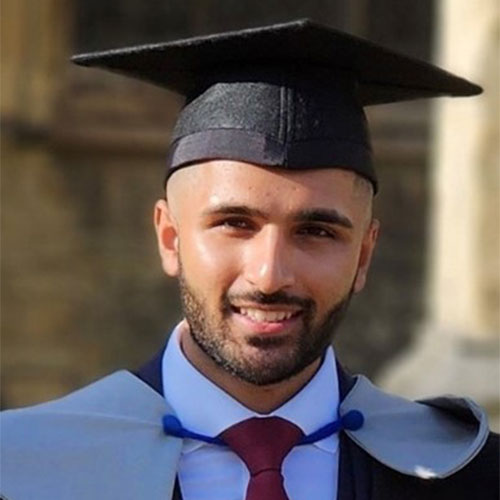
My journey to MUFG – “You miss 100% of the shots you don’t take!”
Sunil
I joined MUFG in August 2023 on the Analyst programme. Prior to this, I studied Financial Mathematics at undergraduate level and completed an industrial placement in management accounting/tax. My industrial placement was my first ever job and it was a great insight into the corporate world; it allowed me to develop my skills and head into my final year of university with further clarity on my future career.
I remember the MUFG Analyst recruitment process very well, it consisted of an application form, online tests, telephone interview with the Early Careers team, and a final assessment day. It became very clear throughout the recruitment process that MUFG is an organisation that welcomes diversity and recognises potential regardless of an applicant’s background. Even still, I almost talked myself out of attending the final assessment day, the night before it took place. I was sure I did not stand a chance of succeeding in my application and thought it would be better to prioritise other applications. I convinced myself that I was not the ideal candidate as I did not study at a ‘target’ university and had no prior banking experience.
Nevertheless, I persevered and gave it my all on the assessment day. I arrived at the MUFG offices thinking it would be an amazing place to work but that it was still so unattainable. I was not able to stomach the food on offer during the day due to nerves, and thought every other candidate was 100x more capable and polished than me. However, I was delighted to receive a call confirming that I was successful in my application less than a week later.
Since joining MUFG I have been able to immerse myself in its inclusive culture. I am very passionate about social mobility and I am a big believer that your background does not have to define your future. MUFG have various Employee Networks and I am a member of the Social Mobility Network (SMN). Through this network, I was given the opportunity to present on my experience of career barriers faced by low socio-economic background individuals in a Social Mobility Network update meeting which was attended by the Executive Sponsors and Co-Chairs of the Network. I received positive feedback and it was great to observe that from the junior level up to senior management, there was a shared understanding of the issues affecting applicants and colleagues from disadvantaged backgrounds.
My advice to prospective applicants is ensure you are well prepared for each stage of the recruitment process and don’t be afraid to showcase your personality. Finally, and most importantly, please continue to put yourself forward for opportunities, even when ‘imposter syndrome’ sets in and you begin to doubt yourself. Had I not attended the MUFG assessment day, I would not be writing this blog right now and I would have missed out on all the amazing opportunities I have experienced in my first nine months at MUFG.
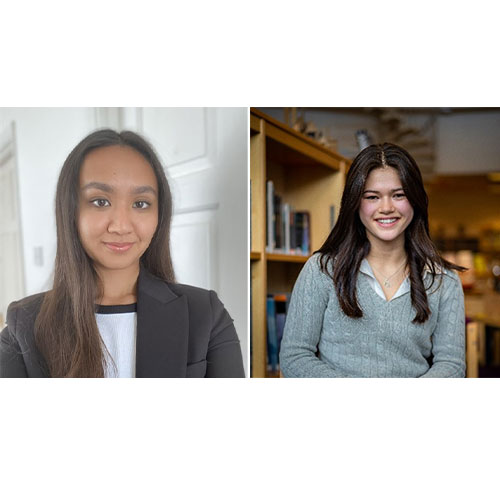
Recruitment Process: Application to Internship
Bibi-Anne and Naiara
We were in the penultimate year of our degrees when we applied for the Compliance internship at MUFG. Following a series of online assessments, video interviews, and an assessment centre at the London office, we were thrilled to receive an offer in February from the Early Careers Team.
The online assessments vary by department, but in our case, they included diagram-based and numerical tests. Contrary to our expectations, the interviews were friendly and conversational, creating an enjoyable experience. Although the assessment centre was our first in-person experience, the nerves were quickly eased by a friendly breakfast and icebreakers, allowing us to connect with fellow candidates.
Throughout the day, we rotated through different activities in small groups. One particularly helpful component was the presence of recent graduates, who had undergone the same process and offered valuable advice and insights.
By the end of June, with our penultimate year of university behind us, the internship officially began. On our first day, all interns gathered at the London office and were welcomed with an organised breakfast, where we met our line managers and buddies.
The initial week of the internship focused on group training sessions within the intern cohort. The comprehensive training we received during this time was instrumental. Through engaging, classroom-style sessions, we explored financial instruments, products, statements, and risk. These discussions offered us a deeper understanding of how banks operate, generate profits, and the vital role support functions play in this process. The sessions were guided by our interests and questions, leading to in-depth discussions on topics such as securitization and derivatives. This tailored approach allowed us to address specific gaps in our knowledge, fully preparing us for the work ahead.
Overall, the experience at MUFG was invaluable, providing significant career development opportunities. MUFG’s commitment to identifying individuals who are eager to learn about finance and excel in team environments was evident throughout the process. For those interested in pursuing a career in finance, we highly encourage you to apply to MUFG.
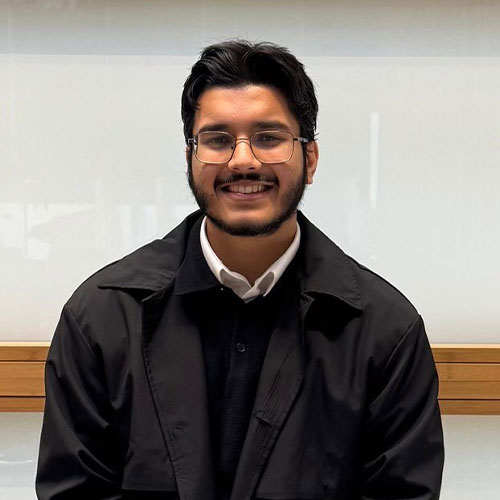
Why Product Control?
Ishaan
1. Why did you join Product Control?
I joined Product Control because it struck me as a department in which I would be able to really dive into the nuances and technical details as to how trading desks make money. I am someone who really endeavours to challenge myself intellectually and therefore I was very much motivated by the prospect of overseeing the PnL of some of the more structured/complex product types. The department largely sits at the heart of the bank, so I knew I would have collaboration with a lot of other teams and be able to leverage their specialised knowledge and experience to develop my skillset.
2. What do you enjoy about Product Control?
I think Product Control, like many other departments in the bank, is one which places a specific focus on optimisation and efficiency. I am consistently challenged to think outside of the box and carefully think about the different ways that trading profits can be presented and reporting processes can be streamlined. There are often new trades to deep dive into, so you’re able to be very close to the action and would also be trusted to build out new process, thus given autonomy and ownership over your work.
3. What is something that people might not necessarily know about PRO (Product Control)?
The job is a lot more technical than I think most people realise/would expect it to be. In order to effectively produce PnL, we really need to know the ways in which each trade makes money and we also need to reconcile the PV and cash moves on many moving parts within a trade ecosystem. As a result, purely by virtue of overseeing the valuation moves of many of these different products, you get a really informed understanding of financial mathematics and you see many complicated pricing concepts in action.
4. Why should someone apply for the Product Control Analyst role?
Again, this echoes the aforementioned, but you really are able to develop a deep base of knowledge and understanding as to how and why banks are able to make money. As a junior employee in your career, it’s important to have a holistic and diverse comprehension of what trading desks do/what market risk do/how collateral is optimised and this team really puts you at the centre of it all. Furthermore, PRO are keen to give you a lot of responsibility from the get-go, which I think is essential for development in your early career, or at least certainly was for me.
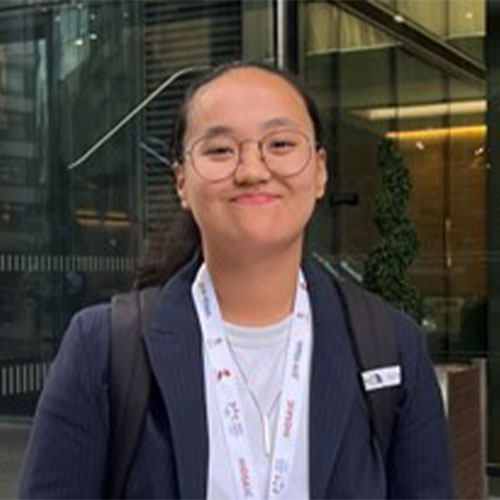
My internship in Technology Innovation Management
Sesema
My internship journey with MUFG began in April when I applied for the summer Internship position in “Technology Innovation Management.” The role immediately captured my interest, as it involved managing AI pilots and innovating organizational workflows—areas I find both challenging and fascinating. After undergoing two comprehensive interviews and delivering a presentation, I was thrilled to receive an offer. The call filled me with a mix of excitement and apprehension, underscoring the significance of the opportunity ahead. The following day, my manager, reached out to welcome me to the team and provide a detailed overview of what to expect in the weeks to come. His warm welcome set a positive tone for the start of my journey.
My responsibilities during the internship were both varied and impactful. I was tasked with documenting test plans, outlining the strategies for testing AI technologies, extracting and analysing data, and providing general support to the team. The learning curve was steep, but the realisation that my work directly influenced the project’s progression was both motivating and rewarding. Additionally, an intern project assigned by the Early Careers Team provided an excellent opportunity to hone my time management skills. This project was particularly enjoyable as it allowed us to explore the various functions within different teams, although the prospect of presenting our findings was initially daunting. Speaking of presentations, I was also given the chance to present to the Head of Technology Innovation Management and am currently preparing for an upcoming presentation at our Town Hall meeting.
I was particularly appreciative of the fact that I was entrusted with meaningful responsibilities from day one, with clearly defined deliverables set by my manager. Although the team was smaller than I had anticipated, this allowed for deeper connections and a more collaborative atmosphere.
In conclusion, this internship has been an immensely rewarding and enriching experience, filled with valuable learning opportunities. From managing significant responsibilities and delivering an intern project to engaging in insightful discussions with colleagues, I have gained a wealth of both soft and technical skills.
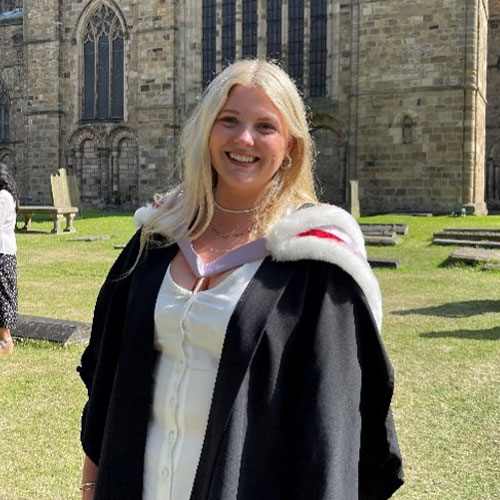
Advice to future interns/grads
Olivia
‘Advice to any future interns/grads in any career is to always remain open and willing to learn’
Having studied Maths at university, I joined MUFG as an intern in the summer of 2022 with a fairly limited financial background. Beginning with a week’s training, the programme brought together students from a variety of degree disciplines to learn about the financial industry and how MUFG operates within it. Through the remaining nine weeks, it was great to gain active experience whilst on the desk alongside exposure to senior colleagues through a comprehensive Business Speaker series; this guided an understanding of different business areas and how they may interact. I really valued the time and effort every employee took to spend with the cohort and each of us individually and with such, saw truth in the ethos MUFG aims to harvest in terms of purpose and vision.
Upon graduating, I took up an offer for a place on the MUFG Analyst Programme. In a similar way to the internship, it began entry training which provided an opportunity to build significantly on any foundational knowledge in addition to an excellent opening to expand networks and collaborate with analysts from a variety of geographical locations.
Over the course of the five weeks, I thoroughly enjoyed working alongside all of the fellow analysts in completing tasks, competing in challenges and ultimately creating a presentation which apprehended the whole essence of the training. These weeks justly captured the essence of alliance within the organisation and reaffirmed the decision I took to return post-graduation.
Beyond the first five weeks, the MAP programme develops parallel to your on-the-desk learning. It gives you opportunities to actively participate in Employee Networks, continue to mature through Business Essential Skills webinars whilst also allowing continual outreach to global colleagues through a chat roulette. The programme encourages well rounded growth of all of its participants and most potently equips everyone with the correct tools to thrive in any organisation.
I joined the Information and Data Management department in both the internship and graduate programmes. Broadly split into two categories, the department aims to analyse a range of data sets to identify issues, validate repositories and implement governance framework alongside working to produce accurate and timely management indexes to support executive decision-making and meet regulatory reporting requirements. The department as a whole has access to vast volumes of information and I have therefore especially appreciated the extensive view of the business and its dealings I have gained whilst working within the liquidity risk space specifically. From an on-the-desk perspective, it has been great to join a team of like-minded individuals with varying levels of experience. I have found it particularly useful to draw upon their approachability and wealth of knowledge to learn beyond the scope of daily tasks and take initiative in new findings.
Advice I would insist on giving to any future interns/grads in any career is to always remain open and willing to learn. Often easier said than done, I believe it to be the single most important thing that has aided my development thus far and the robust employee focussed culture at MUFG has encouraged this greatly.
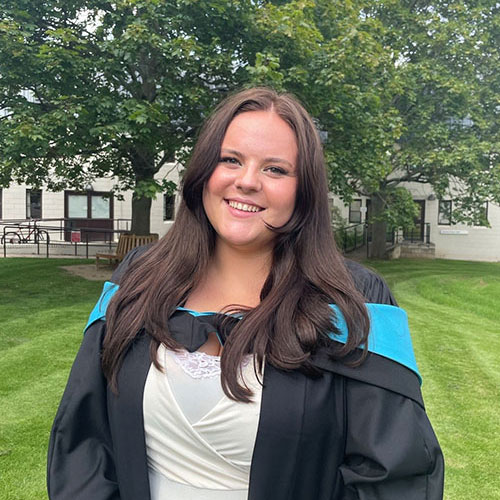
MUFG beyond the desk job
Bethan
Having joined as a graduate analyst, this month marks my one year anniversary at MUFG EMEA in London and it feels like a poignant time to reflect on my journey so far. I joined MUFG after completing a Politics, Philosophy and Economics degree at the University of Warwick with no experience in finance but with internships in Head Hunting and economic research.
Despite my limited financial knowledge, what I was most nervous about was adjusting to a new environment. As an individual who is disabled, I was unsure how to navigate this new challenge, what support would be available to me and whether I would be able to adapt to different challenges. What quickly became one of my favourite things about MUFG is how kind and supportive my colleagues are, particularly in regards to my disability.
I quickly realised this organisation was actively trying to support and improve the lives of disabled colleagues and I wanted to be part of the change. MUFG EMEA has employee networks that represent a themes such as gender, sexual identity, family, social connection and charity. The graduate scheme encourages you to actively participate in these networks and I chose to join DisAbility Works which strives to improve the life of disabled people inside and outside the office.
Throughout the year, I became increasingly involved in the network and began working closely with the leadership team. When an opportunity arose to apply for the role of Co-Chair in the network, I jumped on it. In this role, you work with HR and the other networks to support employees by organising events, promoting internal change and acting as an additional point of support for colleagues.
I have now been in this role for a few months but even in this short time we have redesigned the strategy for the network to broaden who it supports and we are currently working with senior leadership to promote open conversation and greater acceptance of those with disabilities. We have put on a several events including a quiz to provide disability education and raise money for charity, Bring Your Dog to Work Day to raise money for Guide Dogs UK and highlight the benefits of both pets and support dogs, a Frozen Yogurt Bar to encourage us to not ‘freeze’ people out and talk about their mental health, as well as working with HR to trial new assistive technologies to support those with disabilities.
Being part of this network has been a huge learning opportunity and allowed me to give back to MUFG. Having a leadership opportunity so early in my career has been a great way to improve interpersonal skills, increase my network and visibility as well as help make a difference by supporting MUFG on their DEI journey.
To new interns or graduates, I really recommend jumping head first into the networks and having the confidence to use your own experiences, knowledge and ideas to help make a difference!
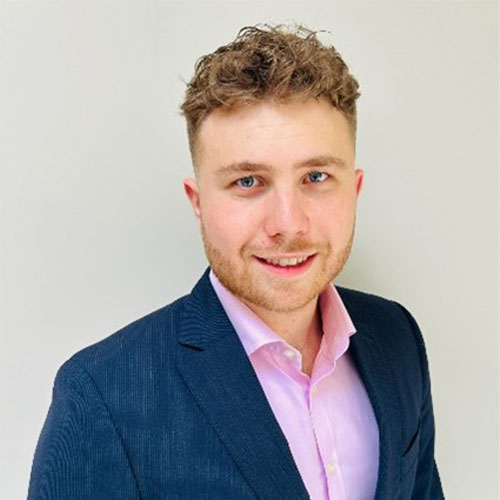
Working in technology innovation management
Matteo
Having studied Economics & Accounting, I joined MUFG Technology Analyst Programme. In this Blog, I will share insight into what its like working in Technology.
In the ever-evolving world of technology, MUFG must strive to stay ahead of the curve by seeking new ways to innovate and improve. This is where the Technology Innovation Management (TIM) team comes into play. Comprising of two key areas, the TEC Business Analyst (BA) function and the Innovation Lab, TIM plays a crucial role in driving system changes, improving efficiencies, and breaking the current status quo.
What is a TEC Business Analyst? The main objective of a TEC Business Analyst (BA) is to accurately analyse current workflows and propose technological system changes across all areas of the bank. The team of BAs is split across various domains, including front office, risk, finance, operations, financial crime and compliance. Through close collaboration with business stakeholders from each department, a BA gains insight into current challenges, pain points, and areas that require improvement. Once the current needs from the business are fully understood, it is the role of the BAs to provide a solution to the issues at hand and set functional and non-functional requirements to develop strategic change.
My first project as a BA was to provide recommendations for a new Securities-Based Lending reconciliation process. This project was not only valuable in expanding my understanding of collateralisation and credit risk, it also provided me with the opportunity to collaborate and learn from various stakeholders in other business functions. Working closely with the Information Data Management team and Trade Platform developers, we were able to identify, map and address the existing challenges and pain points found within their operating systems. This allowed us to strategise and implement effective system changes to improve and streamline the process.
What’s the function of the TEC Innovation Lab? This area of TIM is tasked with fostering creativity and nurturing a culture of innovation within technology and the business. By identifying the most relevant and beneficial Generative AI solutions and the latest technological advancements, the Innovation Lab helps enhance decision-making processes, streamline operations, and create new opportunities for growth and collaboration.
In this space, I had the freedom to develop an application that allowed users to find technology employees based on specific skills and project expertise. Before development went underway, a pitch was necessary to the technology management team in order to gather feedback and concerns. This was my first time presenting to the management team and nerves were running high. Key takeaways from this experience: ensure the vision and ideology is clear and understandable from the get go – it’s important that engagement is made from the first 30 seconds of your pitch, take time to state and explain the value add of your idea and walkthrough mitigating any potential pitfalls.
Currently, I am assisting with the planning and modelling of an AI Documentation Tool with an external vendor. This tool looks to utilizes large language model technology to analyse existing written documentation and process flows to assist with future high-level documentation write-ups. Developing and working through proof of concept projects as such serves as a testing ground for futuristic technologies and ideas. This is what makes working in TIM so enjoyable – it allows experimentation and continuous learning.
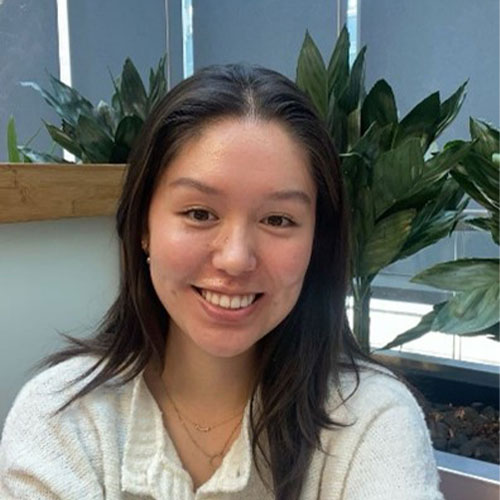
Philosophy to finance: Redefining success in investment banking
Isabella
Entering the world of investment banking after studying philosophy may seem like a leap from the abstract to the concrete. When I first joined the bank, I expected to be met with scepticism from some peers and colleagues who questioned the relevance of my philosophical studies in the finance industry. However, I quickly realised that my background did not hinder my success at the bank.
When I first began recruiting, I grappled with the notion that my lack of technical expertise compared to some of my peers might be seen as a flaw in my application. Yet, during the interview process with MUFG, I came to realise that interviewers were not solely focused on testing my knowledge of financial concepts. Instead, they were keen to assess my potential to thrive within the bank and the broader industry.
It is more important to them that you fit the culture of the bank and show a genuine curiosity to learn. With that, my top piece of advice for prospective applicants is to prepare thoroughly for interviews and show an interest in finance, but do not shy away from showing your personality and passions. While staying informed about market trends is essential, there is no need to feel overwhelmed by mastering complex financial models or concepts at this stage.
Beyond the interview process, success at MUFG is much more than merely having lots of prior financial experience. Excelling in your role is multifaceted, from performing your daily tasks to a high standard to fostering connections across the bank. These interpersonal skills, not typically taught in a formal degree programme, are what sets you apart.
In my eight months at MUFG, I have had the privilege of interacting with colleagues from diverse backgrounds. MUFG places a high value on diversity and this contributes to the rewarding workplace culture that defines MUFG and makes it such a great place to be.
All of this is not to say that a finance background is not helpful, as it undoubtedly offers advantages. That being said, the ability to work diligently, think critically and adapt under pressure holds far greater value than technical expertise alone.
Breaking into investment banking without prior relevant knowledge can be daunting, especially when competing against candidates who flaunt finance experience. However, effective communication, strong interpersonal skills and problem-solving skills are invaluable assets which can set you apart.
The myth that your university studies must dictate your career path is becoming obsolete. MUFG fosters an environment in which diverse perspectives are not only accepted but celebrated, and I encourage anyone who is interested to apply for the position!
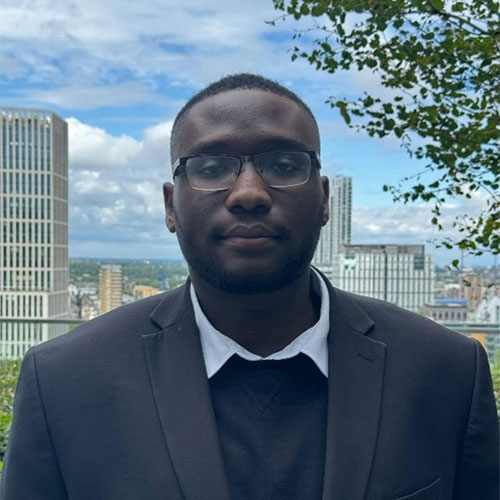
My fascination with technology
Chidubem
Introduction: Curiosity for the Field
My journey into technology began during my GCSEs when I developed an unexpected interest in computer science. Initially, I wasn’t particularly skilled in technical subjects, but computer science offered a different experience. Learning about algorithms, programming techniques, and problem-solving, I realised how these concepts could improve everyday life. This newfound curiosity turned into a passion as I found myself gravitating towards technology, spending weekends reading about the field instead of playing sports. It became clear that technology was the only field I could envision myself working in.
This path led me to university, where I created a heart rate monitoring project to improve lives. Today, I find myself making a difference by working in a bank like MUFG.
Embracing a New Challenge
Transitioning from a tech-focused environment to a role that fuses financial and technical knowledge was both challenging and rewarding. Before finishing university, I decided to apply for jobs in the financial sector to enhance my financial expertise. My long-term dream is to start a gaming/health-tech company, but I realised I needed a solid understanding of financial logistics. This led me to the analyst graduate programme at MUFG, which I joined last summer.
The MUFG Experience
At MUFG, I underwent six weeks of financial training for my role as a technology analyst in the AMD (Architectural Middleware and Data Management) Department. My first rotation was with the app dev team, where I worked on SQL-related problems and developed a full-scale application for the compliance team. This role exposed me to new technologies like Angular for front-end development and C# for middleware. I also learned how to manage and deploy applications using GitHub and schedule jobs using Control-M.
During this time, I updated C# code to create new reports for market data. This involved analysing existing data structures, optimising queries, and ensuring the reports met stakeholder needs. This project honed my skills in data management and software development, showing the tangible impact of my work.
My colleagues were incredibly supportive, guiding me through unfamiliar tools like Control-M and SDA application deployments. I collaborated with other teams, addressing code improvements and programe updates. This experience taught me how to incorporate MUFG’s vision of providing excellent service to stakeholders and delivering outstanding results.
Growing in the Financial Tech Space
Currently, I am in my second rotation in the Enterprise Data Management (EDM) team, where I am enhancing my analytical skills. My role involves documenting processes in a way that business stakeholders can understand, improving business efficiency. This rotation has further expanded my knowledge and skills, preparing me for future challenges and opportunities.
Conclusion: A Perfect Blend of Passion and Purpose
Choosing a career in technology at a bank like MUFG has been a rewarding decision. It combines my passion for technology with the opportunity to make a positive impact on customers’ lives and the broader financial ecosystem. The fusion of financial and technical knowledge has been intellectually stimulating and essential for my long-term career aspirations. As the banking industry evolves, I am excited to be part of this journey, contributing to innovations that will shape the future of finance. I encourage any individuals interested in technology to apply to MUFG. I can’t imagine any better place to start your career than here.
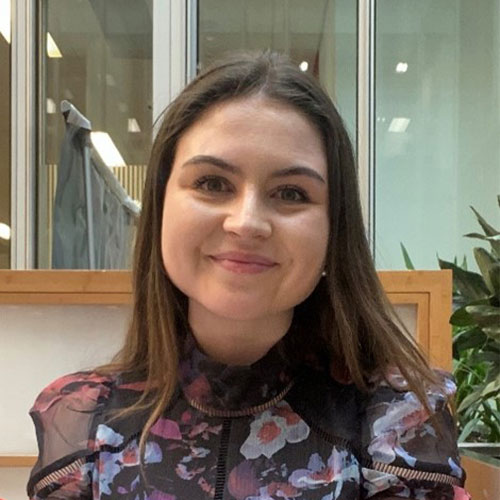
What’s it like being a graduate at MUFG?
Caoimhe
I remember being quite nervous on my first day in the office. Questions such as “what do I wear?”, “what do I speak about?”, “what’s working in a bank like?”, raced through my mind. Within an hour, all these apprehensions were put to rest. The inclusive and supportive culture at MUFG EMEA is evident from the moment you walk through the front door. Any misconceptions that I had about the world of banking were immediately negated.
The first five weeks at MUFG are centred around giving all graduates a foundation level knowledge of the skills necessary for their respective roles within the bank. It was a great opportunity to spend time with the other graduates and to make connections with people working in other roles elsewhere within MUFG. One of the highlights of the training programme were Q&A sessions with senior members of the business. It was fascinating to understand the experiences, opportunities and challenges each individual had encountered on their career journey. Hearing from them directly gave us, the graduates, huge encouragement and insight, into what could be in store for us!
As a graduate on the Global Corporate and Investment Banking scheme, I am rotating through three teams over my time on the graduate programme. Something I have appreciated when joining each new team is the autonomy that is given to you from day one. You are given the opportunity to own each task that you complete, whether that be as small as writing an email or the feat of putting together an entire pitchbook for a client. The variety of work keeps you on your toes and ensures that every day is interesting.
Alongside the opportunity to work on a variety of topics, there is also a myriad of great events to partake in alongside work. The Early Careers team organised a series of sessions to assist graduates with improving essentials business skills such as communication skills and time management. There are many other events including hearing from guest speakers and networking opportunities to make the most of.
You can also get involved with employee networks which are employee-led groups which aim to highlight different perspectives and address important topics. I joined the Corporate Social Responsibility (CSR) network where I have enjoyed organising events within the community alongside other graduates. All of these events give a unique opportunity to network with other colleagues, at all levels of seniority, allowing me to make connections that I know will be valuable in my career going forward.
Everyone at MUFG is very enthusiastic about building a great future and culture for all employees. If you’re eager to learn and join a great team of colleagues who respect different views and value collaboration, then I’d definitely encourage you to apply!
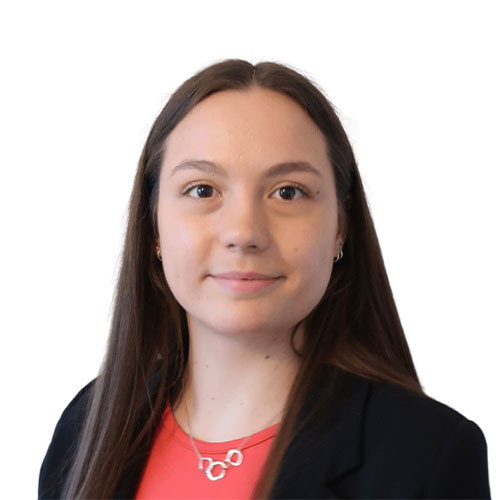
Chemistry to investment banking
Evie
After completing a 10-week internship in Transaction Banking, I joined MUFG permanently through the GCIB graduate rotation program. As part of these programs, I have learned a great deal and developed a lot as a person, finding them both incredibly rewarding and challenging. Previously I studied Chemistry at university and have not come from a traditional economics or finance background. At first, it was a steep learning curve with new abbreviations and acronyms seeming like a foreign language. However, the friendly and supportive environment at MUFG was the ideal place to learn.
My passion for the environment sparked my interest to work in finance as the economy is fundamental to driving change. It’s an exciting time to be an environmentalist in finance as new products are emerging that incentivises companies to be more sustainable. During my first rotation in Structured Trade Finance I worked on a novel carbon permits deal which was highly rewarding knowing the output had a sustainable impact. MUFG is a market leader in Green loans and bonds, alongside work in Project and Export Finance, committing 35 trillion yen in sustainable financing.
During the graduate program, I participated in a 5-week training course that covered the fundamentals of banking, such as corporate finance, modelling, Excel, and presentation skills. The interactive sessions were a great opportunity to meet other graduates and gain a solid foundation for future work.
However, I have learnt most from my day-to-day work; in each of my rotations, I have found that colleagues will always make time to discuss or explain anything. I’ve had very supportive buddies as part of the Buddy program, answering all my questions, from demoing cashflow modelling to going through complex transactions in detail. Being part of an organisation that focuses on junior development has enabled me opportunities to voice my opinion, attend meetings with senior colleagues and work on live deals – opportunities that have accelerated my professional development.
Being supported and given a good balance of work that is challenging but not stressful has allowed me to seek personal development by studying for the CFA, being a committee member for an internal network, and attending conferences and external training courses. I am very grateful for these opportunities and found my line manager supportive of development away from my desk.
Transitioning into the world of finance has been a lot smoother than I expected, predominantly due to the emphases on development at MUFG. My background in Chemistry has helped working with pharmaceutical and energy companies and although daunting at first I have built hugely on my financial knowledge. Coming from a non-finance related degree, colleagues do not expect you to be an expert but overtime you will gain the relevant expertise with exposure to the industry.
I am pleasantly surprised that I have met plenty of colleagues from science and engineering backgrounds. MUFG values diversity and recruits’ individuals from all degree discipline and backgrounds which is part of what makes MUFG such a great place to work. I would encourage any non-finance prospective intern or grad to apply to MUFG and advise that you play to your strengths, take advantage of every opportunity and just be yourself, the rest you will learn on the job.
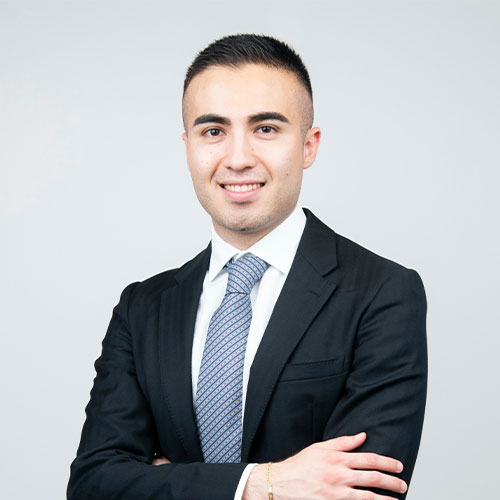
Working in debt capital markets in Paris
Ryo
I joined MUFG 18 months ago, excited to start my full-time career at a global Japanese bank. Since the start of my undergraduate degree, I knew that my ambition would be to begin my career within a global bank. Through this post, I would like to share some insight into my experience so far:
Training Program
As part of the MUFG Analyst Programme, I have had the opportunity to complete a five-week training programme in London, meeting other graduates based in the UK, the US and in the EU. This has been an interactive and valuable learning experience, where I learned more about the different areas of MUFG through theoretical sessions and applied group exercises, as well as through workshops involving panel speakers from the industry.
As a full-time Analyst in Debt Capital Markets (DCM), I was hired straight to the Sustainable Financing desk where I am completing most of my 18-month graduate programme. As part of the programme, I also had the opportunity to rotate across two other teams – Loan Capital Markets and Credit Sales – and gain a deeper understanding of MUFG’s broader product offering as well as how the different teams work together across offices.
The Paris Office
Working in the Paris office adds a French touch to MUFG’s graduate scheme. The Paris office is rapidly growing, with juniors being assigned to a range of responsibilities from the beginning and actively contributing to the team from day one. More responsibilities also come with valuable client exposure that you would not get elsewhere which help strengthen the communication and client engagement skills necessary to grow professionally and succeed in a front office role in the long term.
DCM Sustainable Financing
Sustainability has become increasingly important in the way companies run their businesses, not only as part of their corporate strategy, but also when it comes to their financing decisions. As part of my role in DCM Sustainable Financing, I produce market updates on ESG Bonds and Loans, create relevant materials for internal and external use – including the preparation of ad-hoc client-related marketing materials – and participate in client discussions on ESG financing.
Employee Networks
I actively support both the Pride Alliance and Connections Employee Networks. I have contributed to the organisation of the EMEA-wide International Day of Pink initiative in the Paris Office, in the context of which MUFG employees were encouraged to participate in the initiative by wearing pink to demonstrate their support to allyship. Through Connections, we will be organising social events in the Paris office early this year, with the aim of bringing together Paris-based colleagues from different divisions and contributing to its culture.
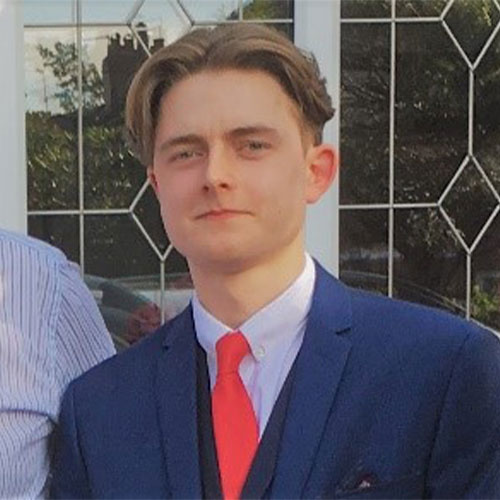
My experience with the MUFG internship programme
Adam
Throughout my time studying Finance, Accounting, and Management at the University of Nottingham, I was fortunate enough to gain insight into the various areas of the financial services and fintech industry. The MUFG internship programme provided an understanding of MUFG’s business services and the operations of a leading global bank. Parts of the programme involved collaborative team working to create market-focused presentations, one of which included a research report that analysed the impact of the macroeconomic policy response to the pandemic on financial markets.
Following completion of the internship and graduation from university, I was keen to join the Analyst Programme for graduates.The Analyst Programme begins with five weeks of technical training that introduces graduates to the various financial products that MUFG provide for their clients. Although this training took place remotely due to the pandemic, the programme delivered multiple interactive sessions. It was enjoyable to work on projects and network with other analysts from different backgrounds locally and globally across Europe and America, many of whom I am still in contact with today. When it came to starting in the office, the colleagues in my team were very welcoming and happy to spend time working through technical and financial concepts. It has been great working with experienced industry professionals who are passionate about sharing their expertise on different product-related structures and valuations. As a result, I have been able to continuously develop my financial product knowledge and professional skills, all while building a strong network.
The Analyst Programme also offers the opportunity to participate in various Inclusion & Diversity and CSR-related initiatives through a range of employee network groups. As a member of the Social Mobility Network, we work towards ensuring that individuals from low socio-economic backgrounds can fully access the opportunities available at MUFG. These activities are a fantastic way to engage with employees from across the bank and attain further insight into the different roles within the organisation. There is additionally a range of network-led charitable fund-raising activities to get involved with throughout the year as well as talks from internal and external speakers that raise awareness of important work/life topics.
A strong attribute of the graduate programme is the early career support graduates receive early on. Graduates are encouraged to follow their interests, which is reflective of MUFG’s strong employee focussed culture. I am excited for the challenges that lie ahead and look forward to advancing my career and building on the skills and experiences gained at MUFG.

Applying to grad schemes
Mirusaine
I joined MUFG in August 2021 as an Internal Audit Analyst on the 18-month graduate scheme. Prior to this, I completed my bachelor’s in Mathematics at the University of Leeds with a one-year industrial placement in external audit. Throughout my degree, I was always unsure of exactly what I wanted to do in terms of my career and so I spent a lot of time looking at the current opportunities available to me and researching what was out there. I quickly realised that there are two main aspects to consider: the role and the company.
The role needs to allow you to effectively use your skills as well as challenge you to learn new skills. Given the vast variety of roles out there, it is important to research the tasks that you would be expected to perform by attending insight days and asking questions!
You will also find that you enjoy a graduate scheme better when the company’s ethos aligns with your personal ethos. This is something that you can understand via networking and talking to current employees through the numerous insight opportunities available. Interviews are also a great way for applicants to learn more about the company and role and are an opportunity to see if it’s a good fit for you, as well as whether you’re a good fit for them. For me, it was important to be working in a role where there is an emphasis placed on personal development, female/BAME empowerment, and a culture of inclusivity, all of which I found here at MUFG.
Joining a new job virtually was not something that I thought would happen and I had many questions about how this would work, how I would be able to gain the most out of the networking opportunities, and how I would be able to learn. This was something that I made sure to ask about during my interview and the responses I received about MUFG’s supportive culture and the hybrid-working system showed me that this is a company that truly cares about the wellbeing of its employees.
Applying for graduate schemes can be a tough process and it’s important to not be disheartened. I would encourage future graduates to be confident in their abilities, network, and be passionate. Applying for graduate schemes that you believe in will allow you to learn and flourish. This is the first step in your career, so it should be in an environment in which you feel valued and encouraged to perform at your best.
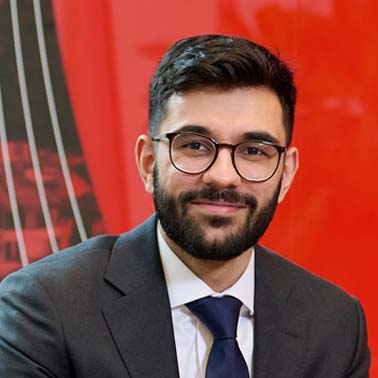
My journey to MUFG
Shamsher
If I could sum up my experience working at MUFG thus far, I would say it’s been exciting, collaborative, and incredibly supportive. I first got introduced to MUFG via the BAME insight day back in 2019, interested in finding out where I would most enjoy working given my choice to study Chemistry at Uni. I had an interest in financial markets from the sixth form; whether I’d be reading Michael Lewis’ books, reading the FT regularly, or posting my thoughts on financial markets on my personal blog, I knew that whatever my future looked like it would be finance-based. Hence when I attended the insight day, I was surprised to find out the myriad of roles at the bank and ones I’d never heard of before, which encouraged me to apply for the internship the following year to learn more.
After successfully getting the internship and despite the initial lockdown in 2020, it still went ahead albeit virtually, due to the impressive efforts of the Early Careers team. In a time when internships and graduate schemes were tough to get into or in some cases canceled, MUFG continued to provide training, work shadowing opportunities, and business case studies during my summer internship. It was this commitment to teaching and learning, and the resiliency of people here that highlighted to me that this was where I wanted to apply for the graduate scheme and ultimately, start my career.
A year later and I can say with confidence that the initial impressions and experience I had at MUFG early on still stays true. The culture here is open and welcoming, and I have many opportunities to take part in such as I&D networks, photoshoots, training new joiners, and hosting corporate events. For example, we hosted a painting taster event as part of the PRIDE network and we had a fantastic turnout! The firm has a strong interest in building your soft skill base and opportunities like that are paramount to your development and growing your network.
To sum it up, my advice to prospective students is that if you’re somebody who likes to take on a lot of responsibility and has an enthusiastic mindset, then you should definitely apply. In addition, MUFG looks for students who demonstrate a strong passion for financial markets and the banking industry. I recommend keeping up with the news and always questioning the knock on impact – it will keep you one step ahead.
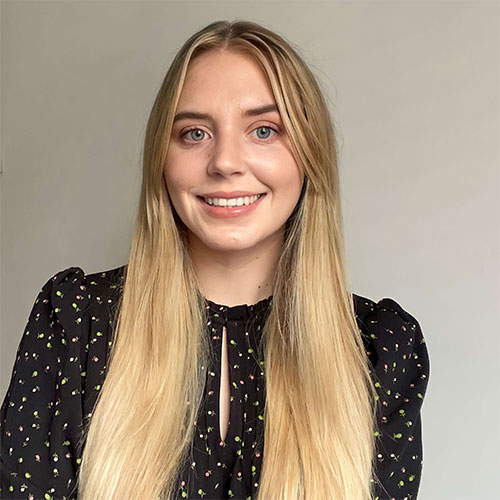
A day in the life of a GCIB analyst
Paige
Hi All,
Paige here, I am currently on my second rotation working with Financial Institutions (FI) Sponsor Coverage as part of the Global Corporate Investment Banking Graduate scheme.
In my current role, I am able to work with a range of our Sponsor and Bank clients. I help to manage our relationships, including our existing products with the client, as well as helping the team in their origination efforts to cross-sell existing products and promote new products.
A day in life can vary significantly, with some days focusing on client meetings, whilst others involve deal origination, preparation, and execution. Other days involve more day-to-day admin tasks ‘Know Your Customer’ queries, presentation preparation, relationship overviews, and email correspondence. Through this coverage role, I have been able to work alongside a range of product specialist teams, providing me with a holistic overview of how the different teams in MUFG work together to meet the varying needs of our clients.
I typically work from the office three days a week. I believe is this a great balance as an analyst, offering the flexibility of hybrid working, but also the opportunities to learn in person, and develop a wide internal network. Networking and taking part in events run by the bank has provided me with a great opportunity to meet people from a range of teams, and hear more about different roles in the company, alongside enjoying the social benefits of being in the office.
My working day also includes involvement in our CSR network. I am a mentor to two school students and have represented MUFG in the local community at charity events, Christmas dinners, and school-employer events. The CSR network has provided me with the opportunity to build my network internally and externally, and create some of my most memorable moments during my first nine months at MUFG.
I believe MUFG offers a unique environment for employees, and in particular analysts due to the supportive learning environment, whether in the office or virtually. There are also opportunities to meet senior employees, and volunteer for the CSR and Inclusion & Diversity networks. Collectively I believe this offers a great opportunity to begin and/or build the career you desire in an encouraging and caring environment.
My top tip and advice on your application for MUFG are to be yourself; prepare well for the interviews and have an interest in finance, but don’t shy away from showing your personality and your hobbies or interests.
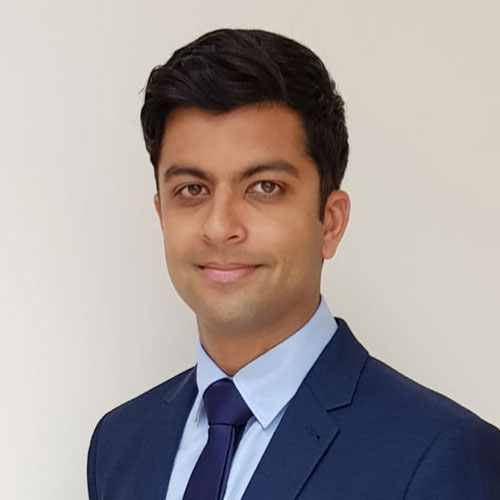
My first insight day at MUFG
Rohil
My first insight into MUFG came from the BAME Insight Day, where I learned about MUFG’s culture, values, and the variety of roles on offer. Upon reflection, two things stood out to me; the rotational aspect of the Structured Finance Graduate Scheme and the differences in culture compared to other investment banks.
As a 2021 Graduate Analyst, I have already rotated through Leveraged Finance and am currently sat in Aviation Finance. The ability to spend time in different product areas across the front office has not only allowed me to appreciate the variety of roles available but has also improved my skill set. For example, my time in Leveraged Finance enabled me to improve my skills in modeling, pitch book creation, and financial statements, whereas Aviation Finance has enabled me to improve my skills in credit analysis, cash flow modeling, and communication. I have particularly enjoyed the volume of client interaction within Aviation Finance since it has allowed me to extend my network externally and build rapport with industry experts. Specific highlights include attending client meetings and the Airline Economics conference in Dublin.
In terms of culture, there are two keys aspects that stand out to me. Firstly, most individuals are more than willing to take time out of their day to support you, be it explaining a new concept or providing feedback on your work. The level of on-the-job training is exemplary and is a testament to the quality of MUFG’s workforce. Secondly, the relatively flat structure within the organisation allows juniors like me to network and have ‘coffee chats’ with senior leaders across divisions. This not only enables juniors to expand their internal network but also to learn more about the different roles in the bank.
Interestingly, MUFG focuses not only on improving our desk-specific skills but also on our soft skills to enable us to become well-rounded individuals. To that effect, we have had valuable sessions on aspects such as networking, meeting etiquette, and how to prioritise tasks. As such, the MUFG Graduate Scheme is a fantastic place to start your career, and I would highly recommend you apply.
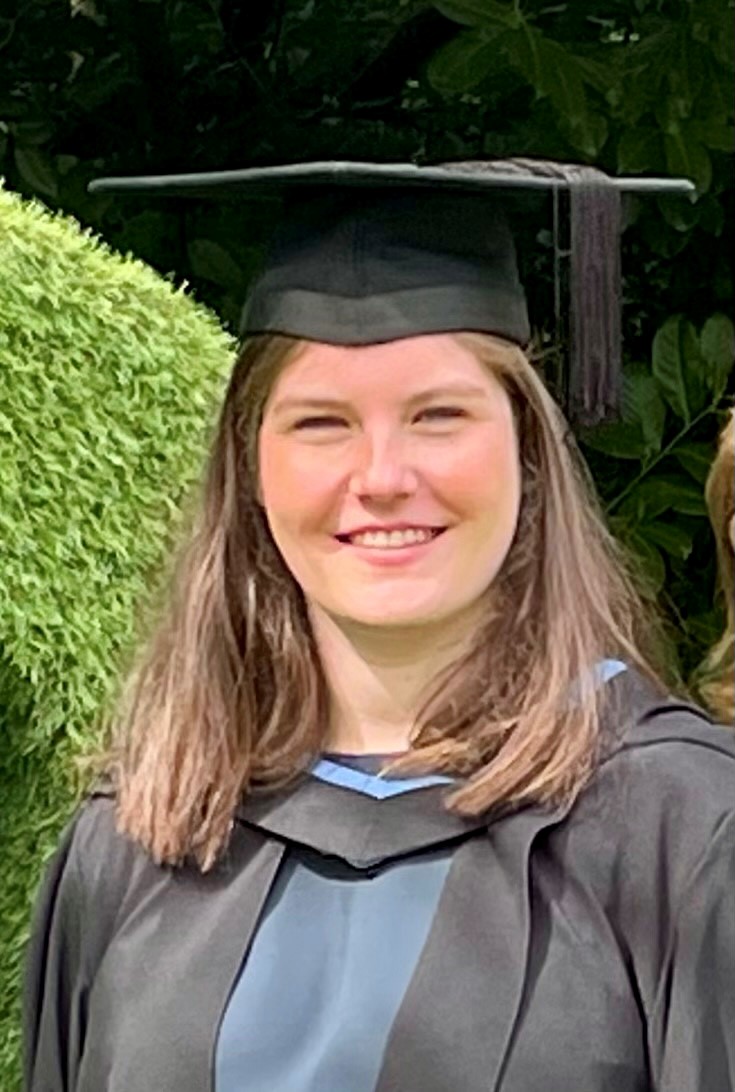
How I got to MUFG – Interviewing during COVID
Sarah
I finished my Bachelor’s degree in Business in 2019 and I knew I wanted to specialise. I had completed several internships across accounting, business management, wealth management, and finance and wanted to gain experience in banking. I had an internship at TD Securities and experienced the work that multiple desks do on a day-to-day basis, which drove me to apply for a master’s degree. After completing my Master’s degree in Banking and Finance in December 2020, I knew I had made the correct choice! I started applying for several roles over different business areas at several banks, including MUFG. One of the main reasons why I applied for MUFG is what I had heard about the inclusivity and CSR objectives of the bank.
I applied during COVID, so it was necessary to undertake the whole application online. I thought the whole process was very smooth and very quick. After completing my application form, I received an email from Early Careers Team saying that I would be well suited for a role as an Analyst in the Information and Data Management Team. After receiving this email, the whole process took around two weeks.
The first stage was a 30-minute phone call with Early Careers Team. I was quite nervous to make a good impression, which doesn’t come naturally over a phone call! Luckily the interview was more like a conversation, and not like a question-answer session that I had experienced at other banks that I was interviewing for.
As the whole process was online, we unfortunately did not have the opportunity to come in for an assessment day. This was substituted with three one hour interviews with several individuals with the wider team and then with my line manager.
Interviews can be a bit daunting, especially if you are not “face-to-face” per se. As before, the interviews were very conversational, which helps calm my nerves, and luckily I had no software malfunctions!
My top tips for the interview process are:
- Give clear and concise answers, with clear examples e.g.if you are asked to give examples of good teamwork/leadership, etc, answer the questions genuinely, as the interviewer is always willing to help out and give prompts if necessary.
- Do your research beforehand and make sure you understand the bank’s core values. I would also highly recommend speaking to people at MUFG prior to applying to understand the different business areas and to understand which area would suit you best. People are always willing to help out!
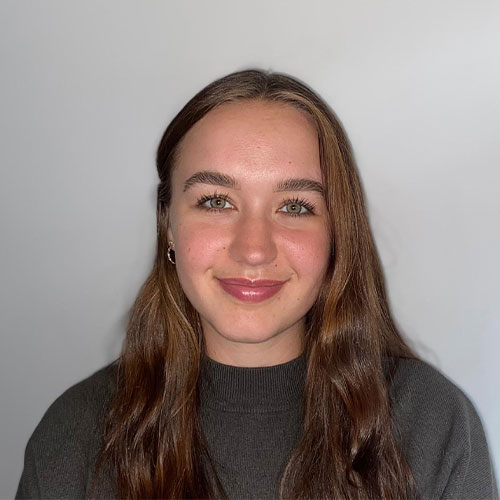
My experience so far: Keeping an open mind
Emma
It has been almost a year since I started on the MUFG analyst programme, making it a great time to reflect on what I have learnt and experienced in my first two rotations: firstly, in Aviation and now in the Credit Analysis Department (CAD). For me, it is easy to identify my two favourite things about MUFG: the people and the opportunities.
During my first year, I haven’t met anyone who wasn’t willing to make time for me, discuss a problem, explain a product, a team, or just have a general chat. It is easy for an organisation to say they have a great culture and ‘flat’ structure, but it doesn’t always work in practice. I can honestly say MUFG have delivered on these promises. It has not been difficult to gain exposure to senior staff and have my voice heard. In both of my rotations, I have found senior colleagues extremely approachable and willing to make time for me and my development. I am so grateful for the respect all colleagues have afforded me so early in my career, reinforcing the idea that my opinions and contributions are welcomed and valid. In addition, the graduate cohort I joined with have been invaluable in my experience. It is so helpful to have a group of similar individuals to share doubts and ideas with, and many of them have become great friends as well.
As soon as I joined MUFG, it was apparent that there is a vast array of things to get involved in, through a whole range of schemes and groups. Aside from the daily job role, there are opportunities to be involved in workstreams throughout the bank. In my first rotation, I was involved in groups working on ESG in aviation, and marketing, which I was introduced to by my manager. Alongside another analyst in my programme, we organised an MUFG netball team through the connections network, which brought people from across the organisation together to play on a weekly basis. This resulted in us achieving second place in our first league. It has also been great to give back to the early careers team by participating in insight days and work experience presentations. All of these experiences have helped me to expand my network and interests outside of my job role and have made my first year extremely fulfilling.
One piece of advice I would give to any incoming analyst would be to keep an open mind. People tend to come into the programme thinking they know exactly what they will like and what they are interested in and end up liking something completely different. The biggest thing I have learnt is that your career is not a straight line, and you do not know what you’re going to be doing in 10, 15, or 20 years. Changing your mindset and removing yourself from the box you may have put yourself in allows you to embrace opportunities to explore new and different products and teams. You can set yourself up for success by learning as much as you can and developing tools for any particular future career path.
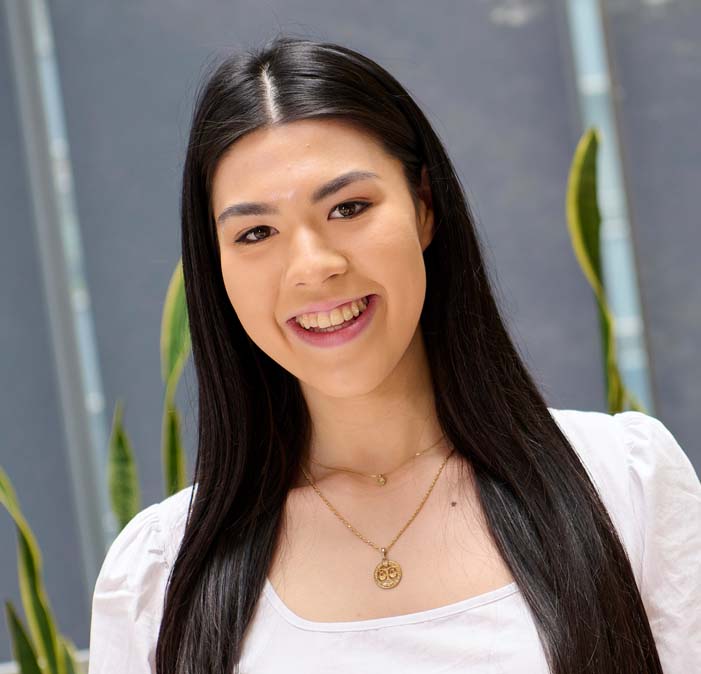
The analyst programme: What to expect
Chloe
“Congratulations! Your application has been successful.” The one thing every graduate wants to hear after several stressful months filled with insight days, cover letters, job applications, psychometric tests, and interviews. All your hard work has finally paid off, but now what?
In the few months leading up to your start date, I’d recommend improving your industry knowledge. Whether that’s reading financial news, listening to MUFG’s own podcast, or even watching films like ‘The Big Short’ (2015) and ‘Rogue Trader’ (1999). Anything that will help to familiarise you with the terms used in the finance industry will definitely be beneficial.
However, if you’re in the situation that I was in where, you have a lot of interest and desire to work in the finance industry, but your educational background wasn’t in finance or economics, don’t panic! The Analyst programme begins with five weeks of introductory training, which is basically a crash course in all things finance. You learn the history of banking, key concepts of the industry, and how to interpret and analyse data and you even work in teams for a ‘client pitch’ exercise. This whole process will bring you up to speed very quickly.
The Early Careers Team here at MUFG ensure the whole joining process runs smoothly and makes each analyst feel very welcomed and supported. On the first day of the programme there were several activities where you are given the opportunity to introduce yourself and learn about the other analysts on the programme. There are also scheduled events like quiz nights and drinks where you get to meet your peers as well as analysts from the previous years in a more informal, relaxed setting.
In this introductory period, you will also meet your manager, buddy (someone from your team who you can ask anything!) and maybe even a few others from your department. Once the introductory five weeks are over and you begin working within your actual department, the support doesn’t stop. From the very start, I’ve been given endless opportunities to develop my skills, network and learn about the company, while being thoroughly supported by the Early Careers Team, my own department and the friends you make while on the Analyst Programme. MUFG is an amazing place to start your career, so don’t worry about what to expect because you’ll be guided and supported the whole time! Be proactive, seize every opportunity and add value however you can!
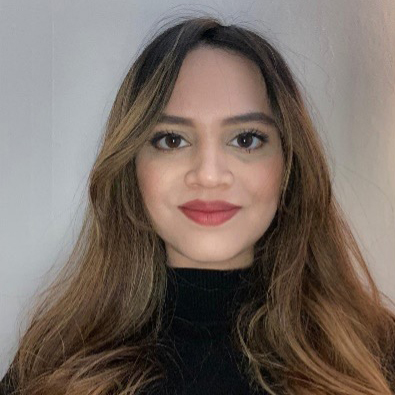
My experience of MUFG’s recruitment process
Tasnia
After attending an Insight Day at MUFG in 2019, I decided to apply for the 2020 Analyst Graduate Programme. The recruitment process consisted of a telephone interview followed by an assessment day. The day kicked off with a welcome speech and a chance to interact with the other candidates, which helped to settle the nerves. The group exercise was particularly interesting. In teams we were tasked with assessing business profiles. It is important to note that your ability to communicate effectively, listen to other’s viewpoints and work effectively in a timely manner with your teammates is what carries the most weight in the eyes of the assessors.
My top tips to graduates for the interview are to provide clear and concise answers which clearly demonstrate the action you took in a given situation and what the outcome was. It is fine to take a few seconds to think before giving an answer and ask the interviewer for clarification if needed. I was pleased to find that the interview was a two-way discussion. This gave me the opportunity to learn about the interviewer’s personal experience at MUFG. I would encourage graduates to ask plenty of questions at the end of the interview.
Throughout the assessment day, there was ample opportunity to network with business representatives from different areas of the business. Everyone was amiable, open and honest. I listened to their stories; their achievements and the challenges they had overcome was inspiring. MUFG’s unwavering commitment to enhancing diversity and social mobility within the organisation also came through during the conversations. Since starting at MUFG I have been involved with the Social Mobility Employee Network which is focussed on addressing the challenges faced by those originating from less-advantaged socio-economic backgrounds.
What was wonderful about the assessment day was that by the time it had concluded, I had learnt more about financial services, gathered advice on how to thrive in a graduate role, and felt far more confident and ready for a career after university. Learning is a non-stop process which appears to be embedded into the analyst programme. Alongside training modules, I take part in webinars organised by MUFG to aid my personal development. I look forward to continuing my career journey at MUFG.
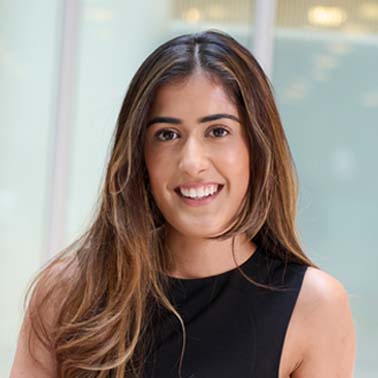
What Makes MUFG different
Shayna

Joining in lockdown – the role of MUFG’s inclusive corporate culture
Robin

What stood out to me about MUFG
Sara
Receiving a notification of my 1 year anniversary at MUFG last month made me reflect back on my experiences since joining in August 2019. What a year it has been! I still remember walking through the revolving doors of the MUFG office on my first official day; a mixture of excitement and nerves. From the assessment centre, I had already gathered that MUFG had an excellent culture. However, naturally, I had a number of doubts: would I get on with the other graduates? Would I be able to handle the work? Would my team be welcoming and supportive? It is safe to say that by the end of training, all my worries had been squashed and I knew that MUFG was the bank for me.
Before starting at MUFG, I studied Chemistry at the University of Warwick. Initially when I began exploring career options, I never really considered banking to be a viable one – who would want to hire a Chemist in the Finance sector, right? But, after speaking to banking representatives at a few career fairs, I decided to attend some Insight days. One of these was an event for female undergraduates called ‘Stand Out’, which gave me the opportunity to network with employees from five different Banks, including MUFG. At the Insight day, it was clear to me that MUFG focused on trust and integrity; enhanced by the Japanese culture present in the Bank. Speaking to juniors from the company, they explained that you were well supported through-out the graduate scheme with five weeks of training when you join, followed by additional credit training. Once you join the desk, you are surrounded by support; everyone is willing to teach you. This was reassuring for someone like me who was nervous that they would be at a disadvantage coming in with a science degree. In fact, I was comforted by the number of successful people in the Bank who weren’t from the traditional finance background.
One of the most notable things I took away from talking to MUFG employees at the Insight day was that so many people had worked at the company for several years. I was astonished when I joined my team and found that my Line manager has been with MUFG for 13 years and my Managing Director for over 30 years. I really think that is truly reflective of the uniquely friendly and supportive culture at the bank which allows employees to have a long-term career at MUFG.
Following the training programme, I joined the Coverage team on a fixed-desk graduate programme. I act as support for a ‘Relationship Manager’ of Consumer & Retail clients. A Relationship Manager’s role is to be the first point of contact for a client. We identify and act on client needs, coordinating with the relevant specialist product teams to collaboratively deliver a first-class service, typically, in time-pressured situations. The products we provide range from relationship loans on the lending side, to market products such as DCM, FX and derivatives. The role requires you to be able to balance meeting client’s needs whilst ensuring the relationship remains profitable.
Having been on the desk for just over 12 months now, I can definitely emphasise the unique nature of Coverage. With so many different stakeholders to manage, it is important to build your network and manage relationships from the moment you join the desk, particularly as you interact with clients from the very first day. The dynamic nature of the role means that no two days are the same. Even within the same sector, clients have varying requirements dependent on the wider economic context. As a result, you are often working on deals for bespoke product solutions that require you to quickly come up to speed with new knowledge. Throughout my year on the desk, I have also been given the opportunity to take on more responsibility as I prove my ability to produce work to a high standard. It is most certainly a role for someone who is eager to constantly learn and develop whilst handling a number of transactions and clients at the same time. All-in-all, I am very grateful for being given the opportunity to work for MUFG and am keen to see how my role continues to evolve after the graduate scheme.
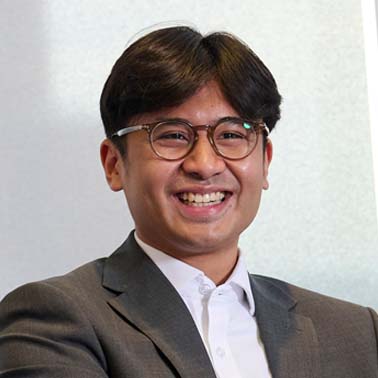
MUFG BAME insight day
Doneill
“Looking back now, as an Analyst in Information & Data Management at MUFG, there is no doubt that coming from a non-financial background with no sector relevant working experience made the mere thought of signing up for the Black, Asian and Minority Ethnic (BAME) insight day at MUFG quite daunting. Yet, as I walked into the foyer, my initial worries were erased when I was greeted with friendly and welcoming faces from the recruitment team, networked with the other attendees and learnt that many of them had similar and non-traditional backgrounds like myself.
The agenda for the day involved talks by representatives from different business units, a Q&A panel with senior leadership, a roundtable speed-networking session with current analysts from an array of departments and, finally, a presentation on the opportunities available at MUFG for interns and graduates alike. From a business perspective, this gave us the opportunity to learn how and where the business operates and recent expansions in the Asia region. As a potential employee we got to hear from different members of the business, including from those who started right out of university, transitioned from support functions to the front-office, and those who transferred from other banks to MUFG. We learned more about international secondment opportunities and why their employees are proud to be a part of MUFG. I found the roundtable sessions particularly insightful as the analysts spoke candidly about their various roles, which gave me a better understanding of the different functions of the company and the opportunities they have had so far in their early careers.
One key takeaway was that at MUFG, you are the driver of your own career and support is available at any point for your progression. Another point was that not only is diversity and inclusion implemented at a grass-roots level, but it is also addressed and acknowledged at all levels of the business, as far as the CEO, as well as being encouraged and supported by the various employee networks. There is no better interview preparation than spending time under the roof of where you are applying, and with the new-found knowledge and confidence from the insight day, accompanied by further research at home, I truly felt confident to pursue a career at MUFG.
And, how could I forget, I got a handy MUFG water bottle that day – which I’m still using now!”

My journey to MUFG: From careers fairs to getting a grad role.
James
In 2018, I attended the Bright Network Festival, where I met welcoming and driven representatives from MUFG, which motivated me to apply for the Summer Internship Programme. After interviews and meetings with various MUFG employees, I was fortunate enough to be invited to an assessment day.
Upon arriving at MUFG’s office, I was nervous but excited to find out more about the firm. At the start of the day, all candidates were given the chance to mingle over breakfast, which gave us the opportunity to get to know each other before starting group activities – a unique part of the day which helped settle my nerves. The schedule consisted of team building activities, group analysis work, interviews and networking. Participating in group activities allowed candidates to collaborate and bring different viewpoints together, which I found particularly enjoyable. Before my interview, I was nervous; this was the most intimidating part of the day! However, my interviewers were friendly and open, and after networking with former interns, I recognised that these were common personality traits among all MUFG employees. Networking with graduates was also an informative way to find out how they coped with the transition from university to working life and to learn, first-hand, about what it is like to work in financial services for a large and diverse firm.
Shortly afterwards, I was informed that I had been offered a ten-week intern position in the Credit Risk department! The team were incredibly supportive and knowledgeable, which gave me a fantastic opportunity to learn about financial products and the risks associated with lending. During the internship, we were encouraged to gain as much experience and knowledge as possible by networking with colleagues from across the business. I had a particular interest in financial markets and decided to reach out to colleagues in the Global Markets division, which helped me to realise that my skills and interests were best suited here. I discussed this with the Early Careers team throughout my internship and was subsequently invited to an assessment day for the Product Control Analyst Programme in December 2019.
As I was passionate about this position, I really wanted to do my best at the Analyst Programme assessment day, and entering a familiar environment and recognising several colleagues went a long way to helping me feel at ease. Some group tasks had a financial markets focus and I was given the opportunity to network with some Product Control Analysts who gave an invaluable insight into their experiences.
At MUFG, you are actively encouraged to explore different divisions of the business, which is something I benefitted from, as in August 2020; I secured a position in the Product Control team. I would advise anyone joining or attending an assessment day at MUFG to be themselves and take every opportunity to learn, as the support given to you by colleagues will assist you in maximising your potential. This is a fantastic first step for my career, and I am excited to pick up where I have left off with my internship and continue with my journey here at MUFG.
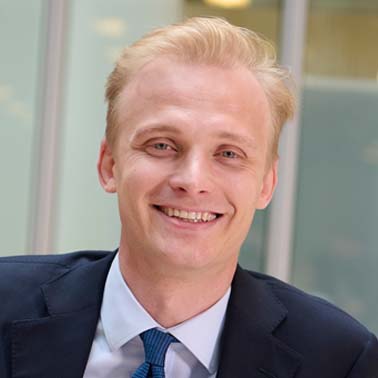
Why I joined MUFG’s summer internship, and why I stayed
Daniel
After completing my Bachelor’s degree, I had completed an internship and gained some experience in a Swedish Equity research boutique, but I still wanted to try working on the debt side of finance before deciding where to start my career. Applying for Summer Internship roles in London, I was applying broadly with the intention of having as many offers as possible to choose from. To be perfectly candid, I did not initially see MUFG as my first choice. However, after participating in a number of Assessment Centres including MUFG’s, I had definitely changed my mind.
Although I knew about MUFG’s global reach as the largest non-state owned bank in the world and it was in the top 10 in DCM league tables, I knew little about the down to earth culture, flat operational structure and focus on really investing in new talent. Speaking to employees, many of whom previously had been Summer Interns at MUFG, I realised that what I needed was not a ‘newspaper headline’ equity name, but a strong debt bank with a focus on talent development, just like MUFG.
Joining the programme, the first week was comprised of a lot of networking with a focus on learning about the different parts of the Bank, as well as some technical training. I personally found the extensive amount of networking very useful as all teams worked and continue to work very closely with other teams, no matter which division you join. The slightly softer start was also an excellent opportunity to get to know the other interns, as many of these people will come to be your close colleagues and in many cases also close friends. This was definitely the part of the internship that I underestimated.
After the first week, it was time to join the specific assigned desk, which for me was the DCM Bonds team within EMEA Capital Markets. From the first day, I felt included in the team and I want to emphasise that the smaller cohort of interns really enables you to establish close connections to very senior people within your team.
For example, working in DCM, understanding the markets and transferring this into communication with your clients is key. As such, after each call or meeting, I was able to have designated time together with a senior attendee to answer any questions I might have, which is invaluable.
I really appreciated how everyone in my team invested time to enable me to quickly acquire the necessary skills. My team and MUFG in general are very adaptable and always willing to customise the learning process for each person rather than trying to push all interns into a universal mould.
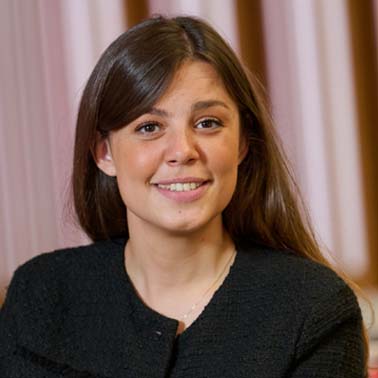
My MUFG experience
Jessica
MUFG hosted the “MUFG Female Insight Event” that gave me a good sense of what it would be like to work there. I was drawn to the company’s focus on trust, integrity and teamwork as well as its long history in financial services. I left feeling eager to discover more about the bank and I ultimately chose to join the Summer Internship Programme. I liked the structure of the programme and the people I met during my interview process. The internship made it possible for me to meet with many different people and get exposure to all the different products throughout the company. The culture is extremely supportive, and I have always been made to feel comfortable and confident in asking questions and learning from those around me. Senior management is really interested in helping you define and shape your career. MUFG ensures that you make the most of your talent and potential providing the right mix of challenges, training and opportunities for new roles.
By the end of my internship, I realised that MUFG felt right for me and was the place where I wanted to build a career. I accepted a full-time position within the Graduate Analyst Programme to work with DCM Investment Grade Loan Origination team, Leveraged Finance team and Securitisation team.
The training that you receive as an Intern and a Graduate Analyst is very extensive. The company does a great job developing people’s competencies and capabilities. The training explained how all the teams across the company contribute to MUFG’s overall strategy and how significant our work at every level is and how we are all working toward common goals. However, the real learning comes from working with your team. There are many knowledgeable employees who are willing to share their expertise. The teams you rotate in allocate a manager and a buddy at senior and junior levels respectively. In my experience, my managers have provided big-picture insight and my buddies have helped answer day-to-day questions, build networks and allowed me to gain outside opinions and different perspectives. They have already positively impacted my career.
There are a lot of ways to meet colleagues throughout the bank. This could be anything from attending lunches with Business Management organised by our HR Department, to doing volunteer work through our CSR team. Continuous learning is important to me and MUFG is a great environment for people who want to learn by offering regular training sessions, networking events and charity activities. It is awesome to see that such events and activities are able to gather people at all different seniority levels.
I don’t really have a typical day. Each day brings new experiences with fresh challenges. For example, we might be working on a waiver request one day and the next, we might be undertaking a borrower rating review, so I am figuring out what my contribution will be and how I can help the team get the request approved internally. When we are faced with a challenge or a difficult task, we work together to ensure we deliver an improved solution to accommodate customers and our firm.
The advice I would have liked to have been given when I was applying for the programme is to make the most of every opportunity to build connections with people at MUFG. When you first join, it is hard to imagine what your eventual role will be. The graduate scheme is so great – you are given the freedom to explore and find the area of business where you will be able to make the biggest difference. At MUFG, the company culture encourages collaboration and learning, so if you are inquisitive by nature you will definitely fit in!
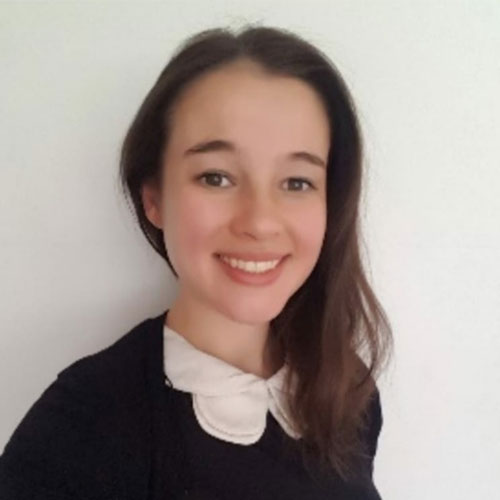
What makes MUFG different?
Cara
I had heard lots of scary things about applying for jobs at big banks in London. Needless to say, I feared the worst. However, after my experience at the MUFG assessment centre, I knew I would be in safe hands here.
So what makes MUFG different? At MUFG, the respect is mutual across all levels; a reflection of the Japanese culture present in the bank. I am not afraid to approach seniors with any queries or questions and having this less formal atmosphere allows you to be more relaxed and get to know the people you work with better, which is key to waking up and looking forward to coming in every morning.
I thought my career in banking was over before it had even begun when I skipped the chance to do an internship in the industry and work abroad over summer instead. Many banks may have dismissed my application immediately, but MUFG listened to my reasoning and could see that my experience was just as legitimate and valuable as anyone else’s, and that I had developed many skills which could be applied to banking. They don’t look for the finished product – they look for an eagerness to learn and a personality that can fit in with the respectful culture.
Moreover, I’ve been able to use my extra-curricular experiences in many ways – from helping sixth form students with interview and CV skills, to helping organise the bank’s annual charity run, to setting up the annual employee children’s Christmas party, to flexing my brain at pub quizzes and lunchtime talks on various issues. There is a big focus here on creating a well-rounded individuals rather than just an employee.
I studied finance at university so I had an idea of what the various divisions within banking do, but the reality is that you don’t know whether you actually enjoy the work until you do it on a daily basis.
Not only does a rotational scheme allow you to experience various sectors and take time to think about where you want to be long-term, it also allows you to network across the bank and this is invaluable. It’s a great feeling to walk into the kitchen and be able to chat and laugh with most of the people in there, because chances are you will have done some work with them at some point. It also gives you an advantage within the team you currently sit in, as you may have extra valuable experiences in a different area or know of someone from another team that can help with an issue. The opportunity to rotate has definitely made me a more knowledgeable employee and this opportunity for flexibility so early in my career has made me more confident about making the right decisions going forward.
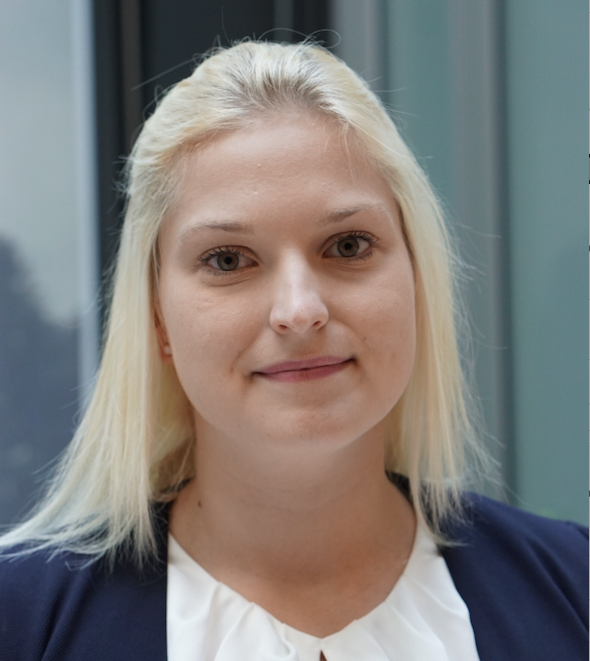
Why I chose MUFG
Amanda
When I had completed all of my courses in my master’s degree and I was three months away from graduating, only my dissertation left to be handed in, my summer internship at MUFG was coming to an end. I was then presented with one of the most difficult choices I have encountered to date – I was offered a full time position at MUFG, and I had to choose between this and a bulge bracket bank position I had already been offered earlier that year.
I would lie if I would say that it was an easy decision, as it was everything but. Fresh out of university, only two internships behind me, it was not easy to make realistic comparisons between these two job offers. Things such as name recognition, visibility, league table positions, market share and compensation might come to mind to many people when trying to decide between different banks. While these are all relevant, they were however not the primary considerations in my case.
What matters to me the most is being able to do work that I enjoy. I had known since the beginning of my two-year master’s degree in Corporate Finance that I wanted to go into Debt Capital Markets. This area was unquestionably of the most interest to me, and I felt my skillset was very well suited for it – a hunch that then got confirmed during my internships.
MUFG was able to guarantee me a position at the team I had completed my internship with, within DCM. MUFG had recognised my suitability, skillset and personal preferences since my first telephone interview, and had taken these into account when making the decision to extend me a full-time offer. Meanwhile, the competing bank was unable to guarantee me a position with the DCM team specifically, regardless of me having been interviewed by multiple people working in the department and having clearly expressed my interest towards DCM. I appreciated, and still do, MUFG’s emphasis on individuals enormously, including but not limited to considerations on skillsets, preferences and personalities.
Another immensely important aspect that contributed to my choice and that I would like to highlight here is the amount of responsibility and recognition I get at MUFG. Since the first day of my internship I was a fully accepted member of the team. I got very senior manager exposure since the very beginning, attending different level meetings daily. Once I joined the graduate programme, I had my first client meeting within a month. I am always given appropriate credit for the work that I personally prepare. I believe that the relatively small team sizes and flat organisational structure within DCM positively contribute to this, and I truly believe that I would not have been able to achieve this level of responsibility this early on elsewhere. This also links to the aspect mentioned above, as individual contribution and skills are recognised, appreciated and celebrated at MUFG.
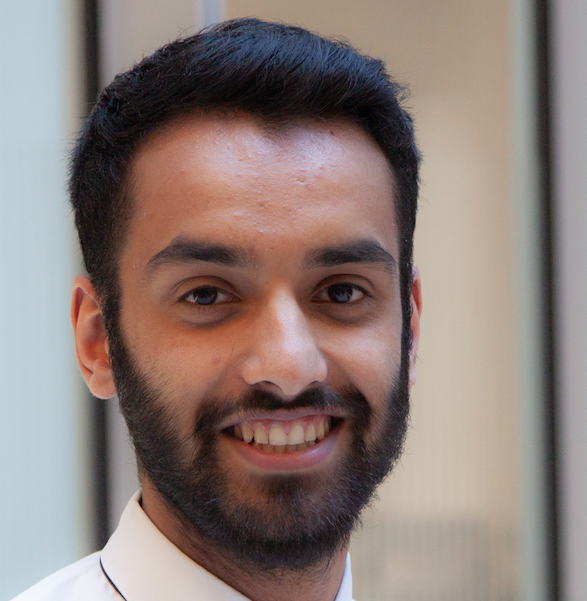
Working in product control
Junaid
At the end of my penultimate year at university, I completed an internship rotating through a number of departments and I was delighted to receive a graduate offer from the Line P&L team within Product Control.
What is Product Control? The Product Control team at MUFG is divided into two sub-departments: Line P&L and Valuations.
The Line P&L team are responsible for the daily P&L reporting for each business area. We provide key financial information by explaining profit and loss in depth with respect to attribution of risk parameter movements, deal activity and market linked commentary. The team is engaged in the launch of new products which are to be traded by the firm in order to evaluate the controls implemented for its P&L reporting. Additionally, on a monthly and quarterly basis, we evaluate the performance of business units by detailing market events and key activity that has driven P&L, in which such commentary is distributed internally.
On a monthly basis, for each of the trading desks, the Valuations team prepare independent price valuation reports and analyse the specific risk parameters which may be driving differences in pricing. These documents provide the relevant financial information to governance forums that are contained within internal reporting packages. The team also run balance sheet and trade population reconciliations to ensure completeness and accuracy of trade valuations.
My fascination to join Product Control stems from a number of reasons, particularly the plethora of opportunity you are given even as a graduate. In the short space of a few months into joining the desk, I was given tremendous responsibility of reporting P&L for multiple business units. This experience enabled me to ascertain the fundamentals of different business functions within an organisation, and vastly broadened my technical understanding, which were facets of a graduate job I was looking for.
In addition to developing my technical competencies, I was also able to hone my interpersonal skills as I regularly had the opportunity to interact with other teams across the business including traders and sales reps. This gives me the ease of developing my network and personal brand within the firm, and the gravity of networking is constantly placed at the forefront within the working world.
Furthermore, working in Line P&L within Product Control, you are given more than just the opportunity of working on different asset classes, but you are able to partake in various projects outside your day-to-day role, transition into the Valuations team if this fits your personal interests and you are able to complete the Chartered Financial Analyst (CFA) exam.
Product Control takes great pride in providing its team members with opportunities that will accelerate both their professional and personal development, and it is for these many reasons why I decided to join this team.

Focusing on the expanding sustainable finance market
Amanda
I believe that any kind of job is done the best by someone who is passionate about the subject. Where the real difference can be seen, however, is when the job is about a subject that is a matter of passion and very close to heart to the other involved parties. I believe Sustainable Finance falls into this category.
While it is an absolutely crucial step in protecting our planet and combating climate change, given that companies who are looking to raise financing for sustainable projects have these values deeply imprinted into the core of their strategy, for any successful structuring process and execution the bankers working with them also need to truly believe in it.
I was thrilled to be offered an opportunity to work with sustainable financing at MUFG, a bank that has now issued five Green Bonds in its own name and been a bookrunner on countless more high profile deals globally, as well as continuously landing near the top in both sustainable loan and bond league tables. Being able to combine my personal interests, beliefs and enthusiasm with my work at a bank with a strong involvement and capabilities in this area has been incredibly rewarding.
Sustainable Financing is an area that will only keep growing, providing more and more opportunities and ever more innovative solutions – it started with Green Bonds and has quickly evolved to Sustainability Linked Loans, UN SDG Bonds, and Green Innovation Bonds (which finance sustainability focused R&D). I am excited to observe and participate in developing new instruments in this space.
MUFG has provided me with countless opportunities to learn and to develop my skills in this field while working with colleagues just as passionate as I am about the topic. I regularly attend conferences and roundtable discussions with Sustainable Financing teams from the other major banks, as well as investors and issuers, with the aim to exchange ideas and further develop the market. At MUFG, I work directly for the Head of Green Bonds, giving me invaluable exposure to senior management as well as clients, and great levels of responsibility and recognition across the bank.
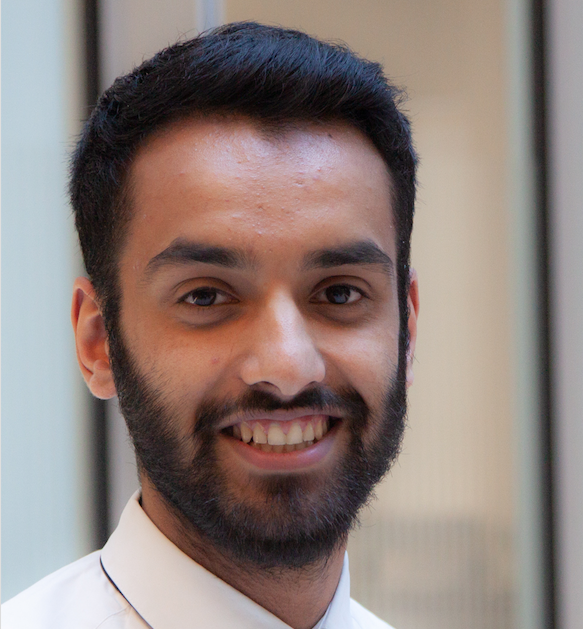
Networking and expanding your profile
Junaid
You might be someone who’s shy like me and can find it a bit daunting talking to new people whom you’ve never met before. So how do you overcome it? Practise! One of my favourite aspects about MUFG is its very flat organisation structure. People like myself who occupy a very junior position (intern) can easily approach and speak with those who are much higher up the corporate ladder.
Let me give you an example of just how flat the organisation structure is at MUFG. On the first day of the internship, the CEO gave a speech welcoming the interns to the firm and stayed after to have a chat with us!
These opportunities are so rare at competing banks, but are frequent at MUFG and what makes it so unique.
To utilise this organisation structure, HR tasked each intern to meet with 10 senior managers from other divisions. At first, this scared me a little. The idea of having to meet with 10 senior managers from various divisions across the organisation was overwhelming. But I assure you, once you start arranging these meetings, it’s hard to stop! It’s a great way for you to know as much of the bank as possible in terms of what exactly the other divisions do, can learn how they are all interconnected and to have the opportunity to speak with professionals from divisions you have an interest in to see first-hand what it’s like working in that field. Not only will this give you a wide insight of the numerous functions that make the bank operate, but will also help you to learn which area you would like to spend your career in.
It’s not only Senior Managers who you can meet; you can arrange to shadow anyone from any corporate title working at any division!
On top of the Executive Challenge and job shadowing, HR has done an amazing job in organising many opportunities for the interns to speak with individuals across the organisation such as networking drinks and Lunch & Learn sessions. Networking sessions enable you to meet with individuals across the firm in a more relaxed environment, where the conversation doesn’t necessarily have to be about work. I’ve had many conversations with people about the Premier League, talking about how amazing Manchester United is! Lunch & Learn sessions are more formal sessions where a Managing Director and an Analyst from the same division take time out of their schedule to speak with the interns about their role and division, in which at the end we can ask any questions.
Partaking in networking events, lunch & learn sessions, completing the Executive Challenge and proactively setting up Shadowing session, will help you to get your name out there and ensure that you know as many people as possible.
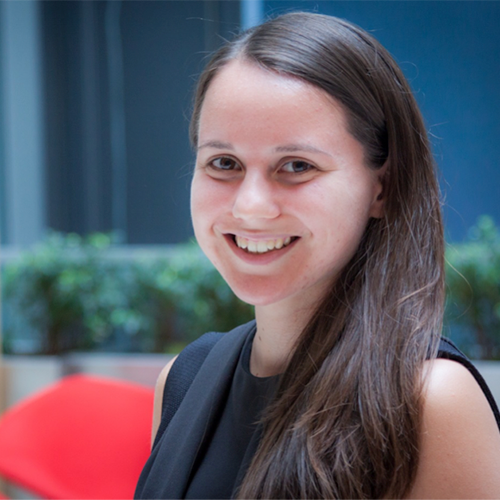
Professional, yet sociable
Alice
As a new analyst at MUFG, I have found that an aspect which makes MUFG unique is its Sports and Social committee. The committee meet once a month to decide on different activities and events to hold for employees. The activities vary from poker and quiz nights to bowling and karaoke. Last week, I attended introductory lessons at an indoor bouldering centre.
Bouldering is similar to rock climbing; however it is climbing without ropes above a soft landing. Routes are identified by the different colour of the rocks, so a climber can link between a starting and finishing point only using a certain colour of holds which are on the walls. The centre has bouldering routes that cater for people all climbing abilities and I was thoroughly excited for my first lesson to begin!
When we arrived we started with a warm up, this gave everyone a chance to introduce themselves to the group and for everyone to get to know each other. We started in a beginner zone, the instructor would teach us different moves and then we would take it in turns to follow. Everyone was incredibly supportive, and as a beginner I found it helpful to receive tips and advice from those who had had lessons before.
When the lesson ended we were beginning to feel a little sore in our arms, so it was perfect timing that we had received our pizza delivery! After enjoying our welcomed break and feeling refreshed we hit the climbing walls again. This time my sub group aimed for more challenging paths, with the help from those who were more experienced I managed to feel more confident and also aimed for harder routes. Overall I thoroughly enjoyed the evening and I have found a fun yet challenging new hobby!
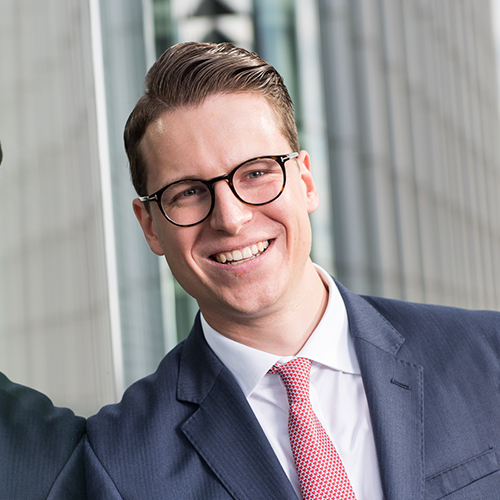
Rotations on the analyst program
Jannis
During my first 6 months at MUFG, I completed two rotations, each lasting four weeks. My first rotation was with Legal and my second one was with the Credit Trading and Sales team.
My final placement in the Analyst Program is with Debt Capital Markets (DCM), but, in order to get a better understanding of the different divisions and how they interact with each other, I had the chance to do these two rotations. Both rotations were a steep learning curve and I learnt a lot – all of which has helped me with my day-to-day work in DCM.
With the Legal department I was mainly reading different EMTN programs to develop a better understanding of bond issuance programs, what they look like and the key aspects that need to be disclosed. As this forms an important part in every bond issuance, I had the chance to learn about the relevant components, applicable for my later role in DCM.
In my second rotation with the Credit team I was shadowing traders and sales people with different regional and product focuses. This gave me huge exposure into how MUFG directly interacts with clients, and what to consider when they price their trades. I was working on different projects, helped provide pitch materials for clients and roadshows and developed a good understanding of market sentiment. Understanding investor appetite and how economic events may impact the markets was a valuable lesson during this time.
Now that I am back in DCM, I can say that the two rotations were exceptional. Apart from the work experience, the rotations helped to increase my network at MUFG and to get to know the people that I only knew via email before. It was very well organised and perfectly integrated in the Analyst Program. The whole Analyst Program so far has definitely met and gone beyond my expectations.
I would strongly recommend the Analyst Program to you, if you are willing to be proactive, are keen to challenge yourself every day and want to learn as much as possible.

Ready, set, trade!
Alice
During our third week of training on the graduate scheme we had a lunch scheduled without any indication about what the event would involve. All the graduates were discussing what the event would comprise and we were placing bets amongst ourselves as to what it would be. I picked up on a subtle hint that was given and managed to guess correctly, we were to begin the trading simulation!
The trading simulation would take place for a month, where we would be able to buy and sell futures linked to real market prices. We were split into three teams, so not only would we be responsible for our individual profit and loss, we were also responsible for the performance of our team and the organisation overall.
The next day, the simulation began. In total we could trade 25 different future contracts. I started to read the information about the futures that sounded familiar; gold, silver, WTI and currencies to name a few. Over the next week I bought and sold futures, and with every trade I felt that I was gaining a better understanding of why I was performing each trade. We would share tips and strategies with each other in the class. For instance Andrew, an analyst who works for the credit sales group in New York, taught me how to calculate stop loss levels based on the maximum amount of money that I was willing to lose on the trade.
Over the month there were many major news items; wheat hit 7 year lows, uncertainty over the Fed’s interest rate trajectory caused global stocks to suffer their sharpest decline since the immediate aftermath of the Brexit vote, the ECB’s unchanged stimulus strategy sharply pushed bond yields up and the BOE, BoJ and the Fed all announced that they would keep interest rates unchanged. As each day commenced I spent additional time reading different news sources in order to gain a deeper understanding of the markets that I was trading in. I found it important to always have a view, and that preparation in advance is crucial to ensure that you are fully prepared for all possible outcomes from major announcements.
Overall, I finished with a profit of £1,313,657 and completed 98 trades. However, what I really gained from the experience was a deeper understanding and knowledge about the markets. All the graduates learnt how valuable it was to share trading ideas, with the more experienced teaching the beginners key tips and facts. The trading simulation was a great taster of what it is like to trade in the real markets; I would strongly recommend this experience to anyone!

Grow with your network at MUFG
Jannis
It has been nine months now since I joined MUFG as a new Analyst in Debt Capital Markets. The program started in August with a four week product and financial training course, where we not only had the chance to develop a comprehensive understanding of financial and professional topics, but also got to know the other Analysts from New York, Hong Kong and Tokyo. This was the first opportunity the expand our network across the firm and to get to know other Analysts from different locations.
Meeting the other graduates and spending four weeks with them on the training program helped us to establish strong connections with each other. As I started working on projects with the other graduates from New York and Hong Kong immediately after the training program, these connections proved to be extremely useful from day one.
After the financial training, the networking opportunities continued and I had the chance to meet employees from all levels of the organisation. The highlight was a breakfast with the International Management Committee where we had the chance to ask questions and get to know the International Business Heads. Talking to the CEO or the International Business Head of Capital Markets, and having the opportunity to ask not only business but also personal questions is not very common and was a unique experience.
Having a great network is important – your hear this at university as well as at every career event for entry-level positions. And MUFG offers many different opportunities to expand your network within the company and your knowledge in different areas.
As part of my program, I am currently rotating through different business departments. The aim is to get to know a number of employees from across the business, to broaden your knowledge and get a better understanding of the firm’s strategic direction, as well as the interconnection between different departments.
Overall, I have found this to be a very valuable experience as MUFG is helping you from day one to develop a strong network across the firm and across different levels of the organisation. You are not only expanding your financial knowledge and getting exposure to different business areas but also you have the chance to learn from different people that are happy to share their experience with you. The only limit is your personal commitment. I am sure that this network and this experience with my colleagues and senior executives will be be a value asset in the future.


